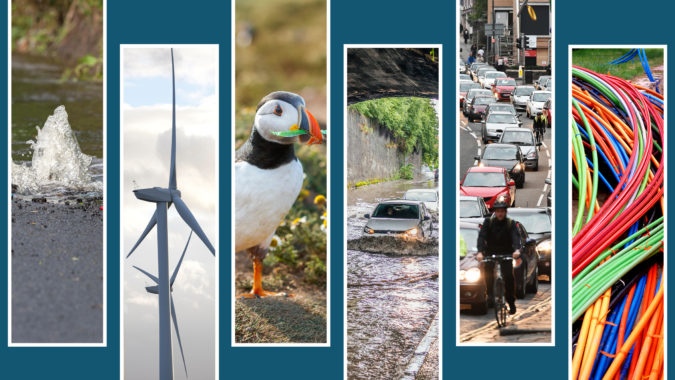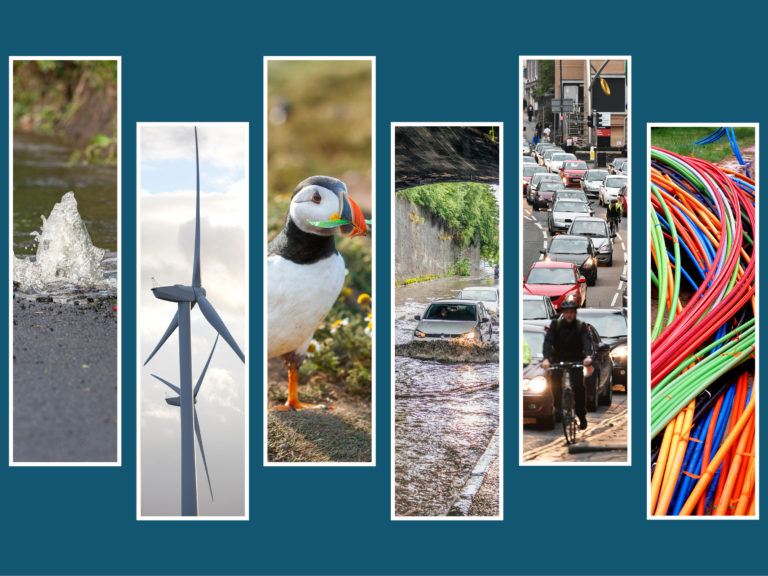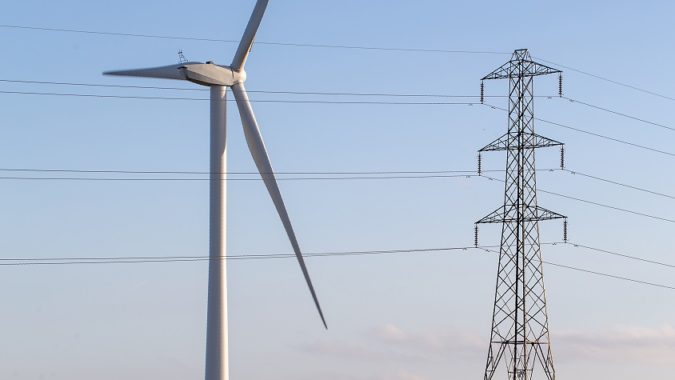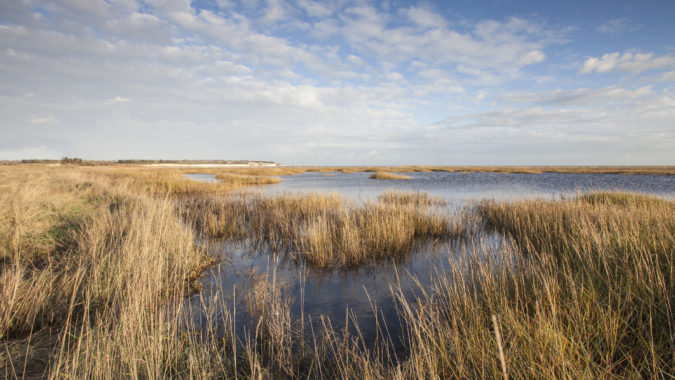Environment & waste
Infrastructure can help us protect and enhance our environment and safeguard natural resources in the face of climate change.
Updated:

Summary
There is very little of the natural environment in the UK today that has not been shaped or impacted in some way by human activity and the infrastructure that has been put in place to support it.
Although there have been some major improvements (for example, better water quality in major rivers such as the Thames), trends over the last 60 years looking at environmental measures, such as biodiversity, show a clear decline.
Infrastructure will play a significant role in meeting the UK’s target of reaching net zero greenhouse gas emissions by 2050 or before. The Commission’s work in this area covers the big challenges and opportunities in moving to a low cost, low carbon future for key utilities, as explored in our energy & net zero theme.
The Second National Infrastructure Assessment makes a range of recommendations across the strategic themes of reaching net zero and supporting climate resilience and the environment. Recommendations cover decarbonising energy and heating, reducing the risks from surface water flooding, and how waste management infrastructure can better support a circular economy.
Our work on transport also helps inform policy making that cuts air pollution and seeks to decarbonise both public transport systems and private road transport, while our work on water and floods helps build community resilience in the face of extreme weather patterns. It is vital that major infrastructure projects consider their Impact on the environment at every stage of their planning and design, as reflected in our design principles for national infrastructure.
In the second Assessment we have also, for the first time, undertaken a quantitative and qualitative risk assessment of the impacts of our recommendations on natural capital. If recommended mitigations are implemented and well designed, we are confident that environmental water quality, air quality and biodiversity will all be improved as a result of our recommendations.
Environment & waste data
Data sets relating to environment & waste are available to review on our Data pages. This includes data sets used in Commission reports, as well as historic data sets. Each can be reviewed online or downloaded.
Review environment & waste dataNext Section: Key issues
Here you will find a summary of the Commission’s position on key issues emerging from our work related to the environment and waste.
Key issues
Here you will find a summary of the Commission’s position on key issues emerging from our work related to the environment and waste.
Infrastructure, the environment and natural capital
Our society and economy depend on access to our natural capital, such as the water we drink, the air we breathe and the food we eat – but UK and global trends show that natural capital has declined in recent decades. Infrastructure is not the only cause of biodiversity decline, but if assets are badly designed and operated, they can exacerbate this problem by fragmenting habitats and polluting the environment.
All new infrastructure assets should deliver environmental improvement, building on the commitment to biodiversity net gain. Our analysis in the Second National Infrastructure Assessment shows that the transport, water and flood risk management sectors have the biggest potential impact. There is therefore an opportunity for these sectors to go further and deliver improvements to both biodiversity net gain and environmental water quality when investing in maintenance and renewal of existing assets, as well as in new infrastructure.
We are continuing to develop our approach to natural capital to further understand how infrastructure affects, and can improve, the environment.
Infrastructure also needs to adapt to the changing climate, and there should be clear expectations on the levels of service offered by infrastructure operators as the risk of climate hazards, such as very hot days and flooding, increase
Energy systems for net zero
With Britain’s commitment to reach net zero greenhouse gas emission by 2050 enshrined in law, the government must now deliver mass deployment of renewable technologies in order to meet this target, keep consumer bills down and leave open the option of a highly renewable electricity generation mix. Our analysis suggests that deploying renewables faster – so that they provide up to 65 per cent of Britain’s electricity – will not change total system costs in either the short or the long term; using existing and emerging technologies can also ensure our electricity supply remains stable.
The Second National Infrastructure Assessment in 2023 identifies that a highly renewable system is the best way to deliver low cost, low carbon electricity. It recommends that government will need to accelerate the deployment of renewable generation, such as onshore wind, offshore wind and solar, supported by flexible technologies that can provide electricity if the sun isn’t shining or the wind isn’t blowing.
Alongside decarbonising electricity generation, a truly national and visible network of rapid charging points for electric vehicles will be required to enable drivers to make the switch from polluting petrol and diesel vehicles.
Decarbonising heat must also be a priority. The majority of English homes – 88 per cent – are reliant on natural gas for heating. To deliver the UK’s emission reduction targets, around 8 million English buildings will need to switch from gas or oil boilers to electrified heating such as heat pumps by 2035, and all buildings will need to move away from fossil fuel heating by 2050. Encouraging this many households and businesses to switch to heat pumps is challenging. But it will be achievable, with enough support from government to support households and businesses to make the switch. To do this the government will need to:
- support households and businesses to reduce their energy demand
- fund the transition to low carbon heat across the public and social housing sectors and for households on lower incomes
- improve the incentives for small businesses, homeowners and landlords to switch to low carbon heat
- rule out providing public support for deploying hydrogen heat in buildings
- plan for phasing out fossil fuel heat, including decommissioning the gas grid.
Improving flood resilience
Climate change increases the likelihood of flooding. UK cities, towns and villages must adapt and improve their resilience to its impacts: currently, about five million homes are at risk.
Floods impact on people’s lives as well as causing economic damage, but the current approach to managing flood risk is piecemeal, with progress on improving protection hard to measure.
Our study on reducing the risk of surface water flooding in 2022 found that up to 600,000 properties could be at high risk of this type of flooding over the next three decades. In response, we called for stricter controls on new developments connecting to existing drainage systems, alongside up to £12bn in additional investment in drainage infrastructure, could move up to 250,000 properties in England out of this high risk category.
The Second National Infrastructure Assessment also set out the need for government to establish a long term target for reducing the number of properties likely to be flooded by rivers and the sea, and to track progress against this. It set out the case for a nationwide standard of resilience to flooding, while also recognising that different standards of protection may be necessary in some local areas. In such cases other elements of resilience such as warning, preparing and recovering from flooding will be even more important. To support this, a new long term funding strategy is needed to better prepare and protect all parts of the country against flooding.
Flood protection should also maximise the use of nature based and catchment solutions, in recognition of the additional environmental benefits they can bring.
Finally, planning authorities should ensure that new development does not increase flood risk elsewhere.
Reducing the risk of drought
Climate change and population growth puts increasing pressure on England’s water: there is a one in four chance of a serious drought before 2050. Boosting resilience, the Commission showed, is almost half as expensive as relying on emergency measures in times of drought (saving up to £20 billion over the next 30 years).
A twin-track approach of managing demand and enhancing supply is needed to deliver by 2050 an extra 4,000 mega litres of water every day to reduce the risk of drought – the equivalent of well over 22 million bath tubs of water. This can be achieved by the government, regulators and water companies working together to deliver a national water transfer network and additional supply by the 2030s, halving leakage by 2050 and better managing demand.
In the Second National Infrastructure Assessment the Commission recommended that government should enable all water companies to roll out compulsory smart metered charging to better manage demand, and argued that water resource expenditure, on both supply and demand, should not be priced out of the upcoming price review in the face of other upwards pressures on bills.
Reducing emissions and recycling more
The solid waste sector contributes around five per cent of the UK’s carbon emissions. While this has fallen since the 1990s, when landfill was widely used for household waste, the growth in incineration as a treatment method means that the sector’s emissions are no longer declining.
Recycling is a lower cost, low carbon way of treating waste that keeps valuable materials in use for longer. But recycling rates have stalled at around 45 per cent, far short of the government’s 65 per cent target.
In the Second National Infrastructure Assessment, the Commission made recommendations to unlock the stagnation in recycling and push materials up the waste hierarchy. It called on Government to implement its proposed recycling reforms, including Simpler Recycling, without delay; to drive improvement at a local level by introducing individual recycling targets for councils; and to ban a wider range of hard to recycle plastics. Too little is currently known about business waste – to start to address this, government should introduce a system to identify what it contains and where it goes.
Even with higher recycling rates, energy from waste (EfW) facilities will play an important role in treating waste that cannot be recycled. These facilities will need to decarbonise to reach net zero. The Commission recommends that this should be achieved using carbon capture and storage (CCS). This means banning future energy from waste plants that don’t have CCS, and preventing councils from signing long term contracts for unabated EfW plants.
Finally, to ensure waste moves up, not down, the waste hierarchy, government should increase the landfill tax to ensure it remains more expensive than energy from waste.
Better by Design
The Commission’s Design Group was established in May 2019 following a recommendation in the first National Infrastructure Assessment, which highlighted how projects can benefit from good design. Chaired by Professor Sadie Morgan, it brings together leaders from engineering, architecture, transport and landscape, to champion design excellence in infrastructure.
In February 2020 the group published the Design Principles for National Infrastructure. This set out four principles – climate, people, places and value – that should guide the planning and delivery of major projects. The government subsequently in its National Infrastructure Strategy committed to the principle of embedding good design in all infrastructure projects, boosted by new design champions on each major project, in line with our recommendations.
The design of national infrastructure must help set the trajectory for the UK to achieve net zero greenhouse gas emissions by 2050 or sooner and provide a method for measuring emissions. Projects should support the natural and built environment, making active interventions to enrich ecosystems and seek to deliver a net biodiversity gain.
Next Section: Headline recommendations
Here you will find a summary of the Commission’s position on key issues emerging from our work on issues related to the environment & waste.
Headline recommendations
Here you will find a summary of the Commission’s position on key issues emerging from our work on issues related to the environment & waste.
Ensure plans are in place to deliver additional supply and demand reduction of at least 4,000 mega litres per day
Government and Ofwat should ensure plans are in place to deliver additional supply and demand reduction of at least 4,000 mega litres per day. Action to deliver this twin track approach should include:
- the Regulators’ Alliance for Progressing Infrastructure Development and Price Review process ensuring that at least 1,300 mega litres per day is provided by the mid 2030s through (i) additional strategic water transfers and (ii) additional supply infrastructure
- the water industry maintaining its objective to halve leakage from 2017-18 levels by 2050, with Ofwat agreeing five year commitments for each company (as part of the regulatory cycle) and reporting on progress
- the Department for Environment, Food and Rural Affairs enabling companies to implement compulsory metering beyond water stressed areas by 2025, by amending regulations as appropriate and requiring all companies to systematically roll out smart meters as a first step in a concerted campaign to reduce water demand to 110 litres per person per day and to reduce non-household usage by 15 per cent by 2050.
Progress measures to control the area of impermeable surfaces to reduce the risk of surface water flooding
In relation to surface water flooding, government should progress measures to control the area of impermeable surfaces, accurately identify areas where the most properties are at risk and set a clear long term target to reduce properties at risk. The appropriate flood risk management authorities should develop single joint plans to deliver the reductions in risk. These plans should be supported by devolving funds from national budgets with local public and private contributions, particularly from water companies where their assets need to be improved to reduce the risk. Full details of the recommendations can be found in Reducing the risk of surface water flooding
Set a long term measurable target to reduce the number of properties likely to be flooded by rivers or the sea
By 2025, government should set a long term measurable target to reduce the number of properties likely to be flooded by rivers or the sea. Progress against this target should be tracked using the Environment Agency’s new National Flood Risk Assessment and take account of property level protection.
In setting and delivering the target, government should:
- use as a starting point the Commission’s proposed standard of protection against flooding of an annual likelihood of 0.5 per cent and 0.1 per cent for densely populated areas
- make use of National Flood Risk Assessment 2 and future iterations of the Environment Agency’s Long Term Investment Scenarios to quantify risk and establish targets for cost effective risk reduction
- adopt different standard of protections in local areas, where cost effective and based on discussions with affected communities
- invest in line with the profile set out by the Commission
- maximise the use of nature based and catchment solutions and consider the additional benefits beyond flood mitigation that they bring
- adequately fund wider resilience measures to prepare for and recover from flooding
- require planning authorities to ensure that from 2026 all new development is resilient to flooding from rivers with an annual likelihood of 0.5 per cent for its lifetime and does not increase risk elsewhere.
Introduce a data sharing platform for environmental data
By the end of 2024, the Department for Environment, Food and Rural Affairs should introduce a data sharing platform for environmental data with clear data standards, sharing relevant developer and local nature recovery strategy data. By the end of 2025 statutory consultees should develop a library of historic and natural environmental mitigations for different kinds of infrastructure. Statutory consultees should also receive and use new resource to gather baseline data and agree strategic mitigations for urgent infrastructure, firstly for wind generation and electricity transmission, and then water resources, by the end of 2025.
Implement waste collection reforms and materials regulations to meet the 65 per cent recycling target by 2035
Government should implement its waste collection reforms and materials regulations, to meet the 65 per cent recycling target by 2035, and work towards higher rates of recycling thereafter:
- without further delay, implement and provide clear guidance on how the collection reforms, known as ‘simpler recycling’, packaging extended producer responsibility scheme and deposit return scheme will work
- by 2026, develop individual recycling targets for all local authorities and provide financial support for transitional costs
- expand the single use plastics ban to cover a wider range of hard to recycle plastic items
- introduce a measurement system, from 2025, on the composition and waste treatment destinations for commercial and industrial waste in England. Where the market is not likely to deliver improved recycling of this waste, government should develop future policies to increase recycling rates further.
Create stronger incentives for investment in the recycling infrastructure that will be needed in the future
Government should create stronger incentives for investment in the recycling infrastructure that will be needed in the future, by banning future energy from waste capacity that does not include carbon capture and storage. Government should increase the landfill tax to ensure it remains more expensive than energy from waste. It should also limit demand for existing unabated energy from waste:
- with immediate effect, local authorities should not sign or renew long term contracts for waste services relying on energy from waste without credible plans for carbon capture and storage
- local authorities with existing long term contracts should transition away from unabated energy from waste at end of contract, or at break clauses where possible
- government should deliver its commitment to bring energy from waste into the Emissions Trading Scheme in 2028.
Ensure better sharing of environmental data
By the end of 2024 the Department for Environment, Food and Rural Affairs should introduce a data sharing platform for environmental data with clear data standards, sharing relevant developer and local nature recovery strategy data. By the end of 2025 statutory consultees should develop a library of historic and natural environmental mitigations for different kinds of infrastructure. Statutory consultees should also receive and use new resource to gather baseline data and agree strategic mitigations for urgent infrastructure, firstly for wind generation and electricity transmission, and then water resources, by the end of 2025.
Ensure technical engineering standards factor in future climate change
By the end of 2026 government should work with the relevant standards bodies to identify and update core technical engineering standards to factor in future climate change
Government should commit to decarbonising road freight by 2050
Government should commit to decarbonising road freight by 2050, announcing plans by the end of 2021 to ban the sale of new diesel powered HGVs no later than 2040. To support this:
- government should, in conjunction with distribution and transmission network operators, prepare detailed assessments of the infrastructure required to enable the uptake of battery electric or hydrogen HGVs, including the refuelling requirements at depots and key rest areas on major freight routes. For battery electric, these assessments should include enhancements to distribution networks alongside alternatives to reinforcement, such as energy storage. For hydrogen, these assessments should cover the production, storage and distribution of hydrogen, including any dependency with the decarbonisation of the heating supply system.
- Ofgem, as part of the next energy distribution price review (RIIO‑ED2) starting in 2023, should include a clear requirement for distribution network operators (in partnership with the freight industry) to map out the infrastructure upgrades and opportunities for alternative solutions, such as energy storage, required to enable large scale freight van charging at depots.
A full strategy for rail freight to reach zero emissions by 2050
Government should undertake detailed cross‑modal analysis, using a corridor‑based approach, of the long term options for rail freight’s transition to zero emissions, including low carbon rail services and the scope for road based alternatives. It should then publish, by the end of 2021, a full strategy for rail freight to reach zero emissions by 2050, specifying the investments and/or subsidies that it will provide to get there.
Latest Updates

Commission pinpoints strategic gaps in infrastructure planning ahead of next landmark national assessment
The National Infrastructure Commission has announced the topics that will sit at the heart of its next major assessment of the UK’s long term infrastructure priorities, to be published in 2023, following analysis of the current performance of key sectors. The priorities will include identifying the infrastructure needed for hydrogen and carbon capture and storage...

Second National Infrastructure Assessment: Baseline Report
Our analysis of the performance of key infrastructure sectors which will inform the work leading to the UK's second National Infrastructure Assessment

“The priority now is to get on with it”: Sir John Armitt responds to government’s net zero strategies
The government has today (19 October 2021) published a number of documents setting out commitments to support the transition to a lower carbon economy. Responding to publication of the Heat and Buildings Strategy, Sir John Armitt, Chair of the National Infrastructure Commission, said: “Kick starting the heat pump market to reduce costs for households to...

Government must get UK ahead of the game in crucial engineered removals sector
The UK government must commit to the wide-scale deployment of new greenhouse gas removal technologies by 2030 in order to meet its climate change obligations, according to a report by the National Infrastructure Commission. The report sets out how the engineered removal and storage of carbon dioxide offers the most realistic way to mitigate the final slice of emissions expected to remain by the 2040s from sources...

Distributional impacts analysis of engineered greenhouse gas removals
Analysis Leeds University/Grantham Research Institute on Climate Change and the Environment which informed the greenhouse gas removals technology study.

Greenhouse gas removal technology attributes
Technical review by Foresight Transmissions of current knowledge on bioenergy with carbon capture and storage (BECCS) and direct air capture (DAC) technologies.

Policy mechanisms for supporting deployment of engineered greenhouse gas removal technologies

Greenhouse gas removal technologies
A study examining how greenhouse gas removal technologies can support the UK's climate ambitions.

Call for evidence submissions to greenhouse gas removals technology study

Public engagement needed for water usage plans to work, says Commission
Today (1 July) government has published a Written Ministerial Statement on steps to reduce personal water consumption. It follows a public consultation on the subject held in 2019, and outlines measures government intends to take to encourage water efficient products and introduce a more consistent approach to leakage. In response, a spokesperson for the National...

Commission backs virtual pavilion at climate summit
The National Infrastructure Commission is supporting the creation of a Built Environment Virtual Pavilion at this November’s COP26 Climate Summit in Glasgow. The pavilion – developed by the UK Green Building Council – will act as a smart virtual presence at the summit, providing a platform for a range of bodies involved in infrastructure and...

Commission backs new vision for relationship between the natural and built environments
The National Infrastructure Commission has today endorsed a bold new vision for protecting and enhancing the UK’s built environment. The Commission is one of more than 35 bodies which have put their names to Vision for the Built Environment, including the Department for Business, Energy and Industrial Strategy, the Infrastructure and Projects Authority, and the...

Policy roadmap needed to achieve “important signal of intent”: Armitt on revised emissions target
The National Infrastructure Commission has welcomed today’s announcement by government that it will introduce a legally binding target to reduce emissions by 78% by 2035 compared to 1990 levels, in line with recommendations from the Climate Change Committee. Sir John Armitt, Chair of the National Infrastructure Commission, said: “This ambitious target provides an important signal...

Valuing natural capital in infrastructure
This week, government has launched a consultation on its draft policy statement on five environmental principles, to be enshrined in the Environment Bill. The announcement follows hot on the heels of last month’s publication of the Dasgupta Review on the Economics of Biodiversity. This landmark report made a decisive link between the economy and nature, suggesting...
